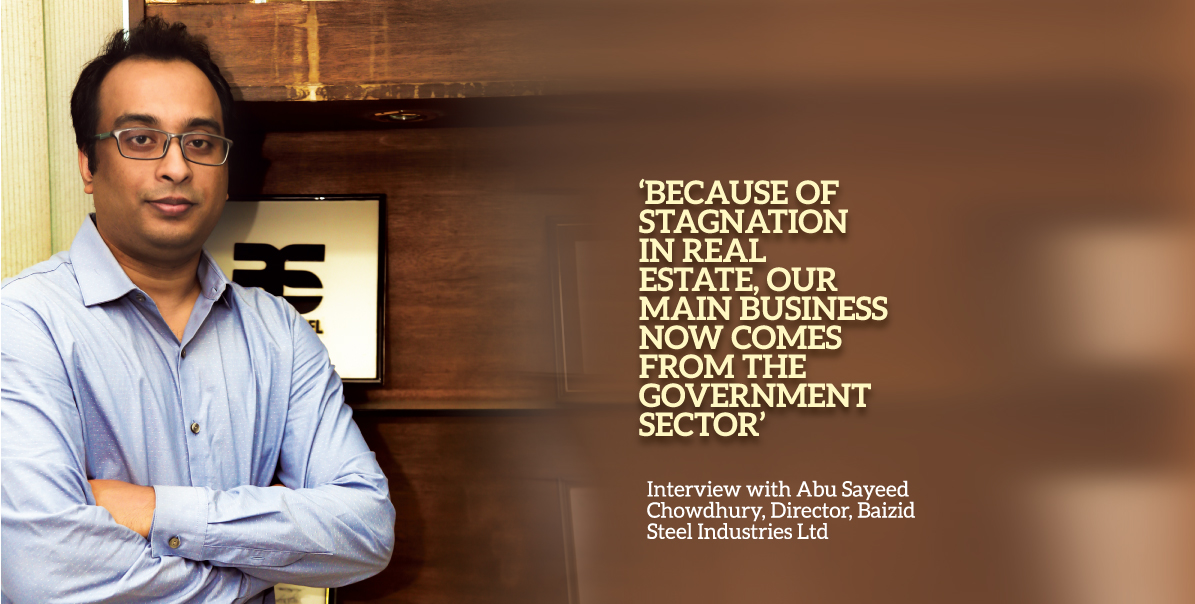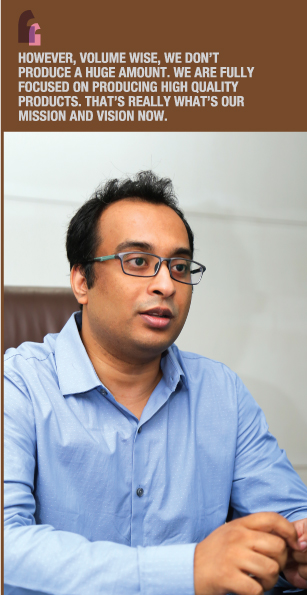
Since its inception in the late 80s Baizid Steel has become one of the leading manufacturers in Bangladesh’s steel market. Fintech spoke with the company’s director Abu Sayeed Chowdhury at his Dhaka office to know more about its business and the steel manufacturing industry.
FINTECH: When you started in the 80s, what was the market like? And what was your vision at that point?
A S Chowdhury: Baizid Steel was founded in 1986. At that time the manufacturing process was completely manual. Our goal from the beginning was to improve our product continuously and meet the expectations of our customers. We always developed our products with an eye for the future.
BSRM has always been the top steel company in the country. We used to make steel the way they did. It was a twisted shape product from TOR steel. At that time that was the best quality steel. Our target was to always put out quality products in the market. As a result we brought sixty grade rod in the late 90s or early 2000s. Now we are using QST bars, which is Tempcore certified from Belgium. This is standard in all developed countries. In Bangladesh only we have this certification. So, we are very much in tune with the latest technologies in the field.
However, volume wise, we don’t produce a huge amount. We are fully focused on producing high quality products. That’s really what’s our mission and vision now.
FINTECH: What certifications are standard in steel manufacturing internationally?
A S Chowdhury: There are two international organisations that provide certification. One is Tempcore in Belgium and the other is TherMAX in Germany. These certification process for us involved a three-year long audit by Tempcore from Belgium. They scrutinized our samples and production plan before giving us the certificate. Even though many other manufacturers use the same procedure for production, we are the only one to get this certificate.
FINTECH: Since 1986 to the present, what changed the most in this industry?
A S Chowdhury: The market wasn’t so saturated then and there wasn’t as much demand as now. And the gap between demand and supply wasn’t as large as it is now. The market wasn’t very competitive. There were just four or five big companies. Buyers had the power then, but now sellers have the power. This is because of increased competition. Price sensitivity is much greater now. As the market expanded buyers can choose from many different alternatives. But all companies are producing good quality materials.
 FINTECH: The BUET certificate is heavily advertised by steel companies. Why the international certification isn’t given more importance?
FINTECH: The BUET certificate is heavily advertised by steel companies. Why the international certification isn’t given more importance?
A S Chowdhury: In Bangladesh the BUET certification matters most. Consumers can send samples to BUET and they can get it done for a fees. Sometimes consumers will take sample from us an have it tested from BUET. We do it as well and give the result to customers.
Other than that there is a UK based certification, which measures ‘ductility’. Ductility is basically finding out what is the breaking point. Since Bangladesh is an earthquake prone area, this test is important for us. But we can have this test done once or twice a year, whereas, you can do testing from BUET at any time. This is mainly the reason why BUET is preferred.
FINTECH: How big is the steel industry? And how do you get your business intelligence?
A S Chowdhury: There is a ‘steel association’ where you can get all the data. Other than that we have partnerships with a few companies and we get information from them. We get data related to consumer demands, service related matters from these sources. We don’t really have survey data. I think all other industries suffer from a lack of reliable data. We have worked with agencies for some research. But other then that we don’t rely on a third party for getting data related to industry demands.
FINTECH: Do you know what is your market share?
A S Chowdhury: We don’t have exact data actually, but we have an estimation. Our market share is approximately 10 percent.
FINTECH: Do you face any regulatory issue that you feel need to improve?
A S Chowdhury: We have some issue with a few things. First, everyone has to import the raw material for steel production. Some raw materials are available from ship breaking, but that’s also imported originally. In fact, the steel industry developed primarily depending on the ship breaking industry. At present all materials still come through import. So, our concern is mainly about problems we face related to import.
There are a number of problems related to importing raw materials. It’s very time consuming, cost of transport is high and high tax. But now we have a strong association and we can push for the necessary changes.
Another challenge is that the steel industry has to rely on gas. Sometimes we have low flow of gas and low pressure hampers production.
FINTECH: You previously talked about getting support from the banks, but also mentioned that the high interest rate is a problem. Do you think this is likely to change in the future?
A S Chowdhury: The rate had dropped sometimes ago, but it’s high again now. Honestly, I don’t think there is any way out of this. If the government grants subsidies then it can change a little. If there are provisions for getting foreign loans at a minimum rate that can also help. If local banks, Bangladesh Bank and the government can take share, then there is possibilities lowest interest possible. Some countries like Vietnam has been very friendly for foreign investment and they have had great progress. I think we might look into a model like that.
FINTECH: Another important issue is the stagnation in the real estate sector. This obviously impacts you. What is the situation now?
A S Chowdhury: It’s getting better now. The bigger companies are now doing well. We had good business with reputed company before 2010. It was so booming then that it used to handover 10 to 12 projects a month, 100 a year. After 2010, the number dropped to 10 to 12 per year. This is because customers or buyers are not getting the financing from banks. So, they are not investing in real estate. I don’t think this has improved much now. This is because banks are not inclined to grant home loans. As a result, everyone related to that is suffering. Currently our main business is from government projects. The government is carrying out infrastructure work, like roads and highways. We also get business from work by the Army.
FINTECH: How much of your manufacturing work is automated?
A S Chowdhury: When we started in 1986, everything was manual. But now we are able to automate 70 to 80 percent of our work. Our billet plant is completely automatic. We need manual labour there only for management purposes. At our steel re-rolling site everything is automated. The manual work is only loading and unloading the rods and sorting them out.
FINTECH: Do you produce all of your billet?
A S Chowdhury: Yes. Actually we sell to others as well.
FINTECH: Can initiatives be taken for preventing damages from earthquake? What is the role of steel in the building structure in terms of safeguarding from earthquake?
 A S Chowdhury: Of course, initiatives can be taken. You have to make sure that the buildings are being built in compliance with the code. There should be steps taken to ensure that the materials are more robust. If the National Building Code is followed and good raw materials are used then the buildings will be a lot safer in the event of an earthquake.
A S Chowdhury: Of course, initiatives can be taken. You have to make sure that the buildings are being built in compliance with the code. There should be steps taken to ensure that the materials are more robust. If the National Building Code is followed and good raw materials are used then the buildings will be a lot safer in the event of an earthquake.
You can never fully predict what will happen in an earthquake. It depends on so many factors like the strength of the quake for example. But if quality materials are used then it’s likely that the frame and the main structure will survive. May be parts of buildings will be broken, but they will not collapse. Especially, if the old buildings in old Dhaka can be restructured that can really make things safer.
Steel has a major role in protection from earthquake. Part of our testing is meant to check this very aspect. We look at elasticity, strength etc. This is the test I mentioned earlier, the ductility test. All factories have this machine for doing what we call ‘universal testing’. We see the bonding between steel and concrete.
FINTECH: You mentioned that your focus is not on expansion. Please explain.
A S Chowdhury: The last time we expanded our factories was in 2011. Our factory is at the centre of Chattogram. There aren’t any room left in the industrial area to set up more factories. We expanded as much as we had room for. Now our focus is only to improve our quality constantly. We only want to think about the efficiency of our product. We are progressing but not expanding in the traditional sense.
Of course, more high-rise buildings are going to be built, roads and bridges will increase in number too. But our focus is not reaching for more market share blindly. Another important factor here is that currently there is more supply than there is demand.
FINTECH: How eco-friendly are your factories? And what is the situation overall in your industry?
A S Chowdhury: The main pollution in steel manufacturing is air pollution. We don’t have any kinds of other byproducts that can harm the environment. Another advantage is that in steel production you can use up to 95 to 96 percent of the steel. We recycle the dust from rods. These are extracted using magnet and used in road construction. China actually buys this dust from us and use it after processing. And steel is such a material that you can just melt it at any time and reuse it. So, there is no waste.
As for air pollution, harmful materials like sulphur get released when we melt the steel. We comply fully with the government regulations of course. Our chimneys have release the fume at 150 feet up from the ground. We obviously maintain that.








